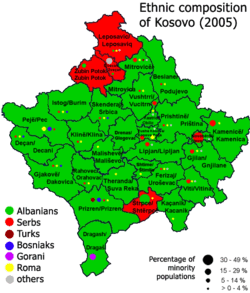Romani people in Kosovo


Romani people in Kosovo living usually in "Mahalas" (segregated settlement) are part of the biggest minority in Europe. Important to mention is that although Ashkali and Egyptians have very similar culture, tradition, non distinguishing physical appearance, most of them do not want to be put together as one minority but as minorities. Mainly there are historical differences claimed. Roma speak Roma language in most cases.; however also the language/s that surrounds them such as Serbian and Albanian. Many Romani were targeted by Kosovo Albanians (Kosovo Liberation Army) with the Serbs during the Kosovo War as being considered to be allied with Serbs and Serbian national interests.
Romani in Kosovo are much depleted from their former numbers, and have been in both stationary and nomadic residence there since the 15th century.
Kosovo Liberation Army (Kosovo Albanians) expelled 50,000 Romani from Kosovo, forcing them to take refuge in central Serbia,[1] but many of them returned to Kosovo. In 2011 there were 36,694 Romani, Ashkali and Egyptians living in Kosovo,or around 2% of the population.
Subgroups
As in other parts of the Balkans, the denomination of Romani has always been subject to outside pressure. In the official census, the labels Romani and (Kosovo) Egyptians were used.
After the war and encouraged by the international community, the label Romani, Ashkali and Kosovo Egyptians and its abbreviation RAE became more common. Whereas the Ashkali and Kosovo Egyptians maintain their distinct origin, this is sometimes contested by Kosovo Romani who claim that all three groups are actually Romani subgroups.
|
Serbian Romani:
|
Polylingual:
|
Albanian Romani: |
Other:
|
Culture
While all the three groups claim ethnic differences between them, they frequently intermarry. Romani weddings to non-Romani (Gadje, outsiders) is extremely rare. Egyptians, Romani and Ashkalija however do not classify one another as Gadje.
Discrimination
They have been subject to nativisation and assimilation, with many having Albanian names depending on the power profile of the day. Most also have their own naming system for use among their own people.
Romani in Kosovo, like Serbs and other minorities, today live in constant fear of further ethnic unrest. Romani unhoused in North Kosovo are today housed in lead-infested camps in North Kosovska Mitrovca.[2]
There is ongoing campaign for rehousing and proper health provisions for the families affected, and a fatality estimate ranges from 27 to 81.
Education
In common with Romani the world over, formal education is of a poor standard, especially among women due both to native beliefs that formal education is unnecessary, and to discrimination in education in the formal schools who are ill equipped for the needs of the Romani children.
Serbianising and Albanianising also lead to the Romani sliding from the educational mainstream.
Third level is not attained by the majority of Rom, and of those who do, they are mostly only half Romani, with there being Serb, Turk or Albanian heritage too.
Kosovska Mitrovica camps
Returning IDPs were housed by NATO / UNMIK in North Kosovska Mitrovica in a lead mine site, and 27 died of lead poisoning. They were helped by NGO the KRRF, led by Paul Polansky.
See also
References
- ↑ http://www.cafod.org.uk/where_we_work/eastern_europe/serbia/the_roma_community_in_serbia
- ↑ See also Viewpoint (Council of Europe, Commissioner for Human Rights): European migration policies discriminate against Roma people by Thomas Hammarberg, 22/02/10
- Who we Were, Who we Are: Kosovo Roma Oral History Collection. The most comprehensive collection of information on Kosovo's Roma in existence. (English)
- http://kosovoroma.wordpress.com/
- http://www.dissidentvoice.org/Articles/Rifati_Kosovo.htm
- http://www.scn.org/roma/survey_intro.html
- http://www.csdbalkans.org/roma/
- http://news.bbc.co.uk/2/hi/europe/4493256.stm
- http://web.archive.org/web/20091026170012/http://geocities.com/~patrin/kosovo.htm
- http://www.blacksheepbellydance.com/writings/files/invrom.html
- http://www.stopnato.org.uk/roma/roma.html
- http://www.iht.com/articles/2005/01/12/ednowicki_ed3_.php


